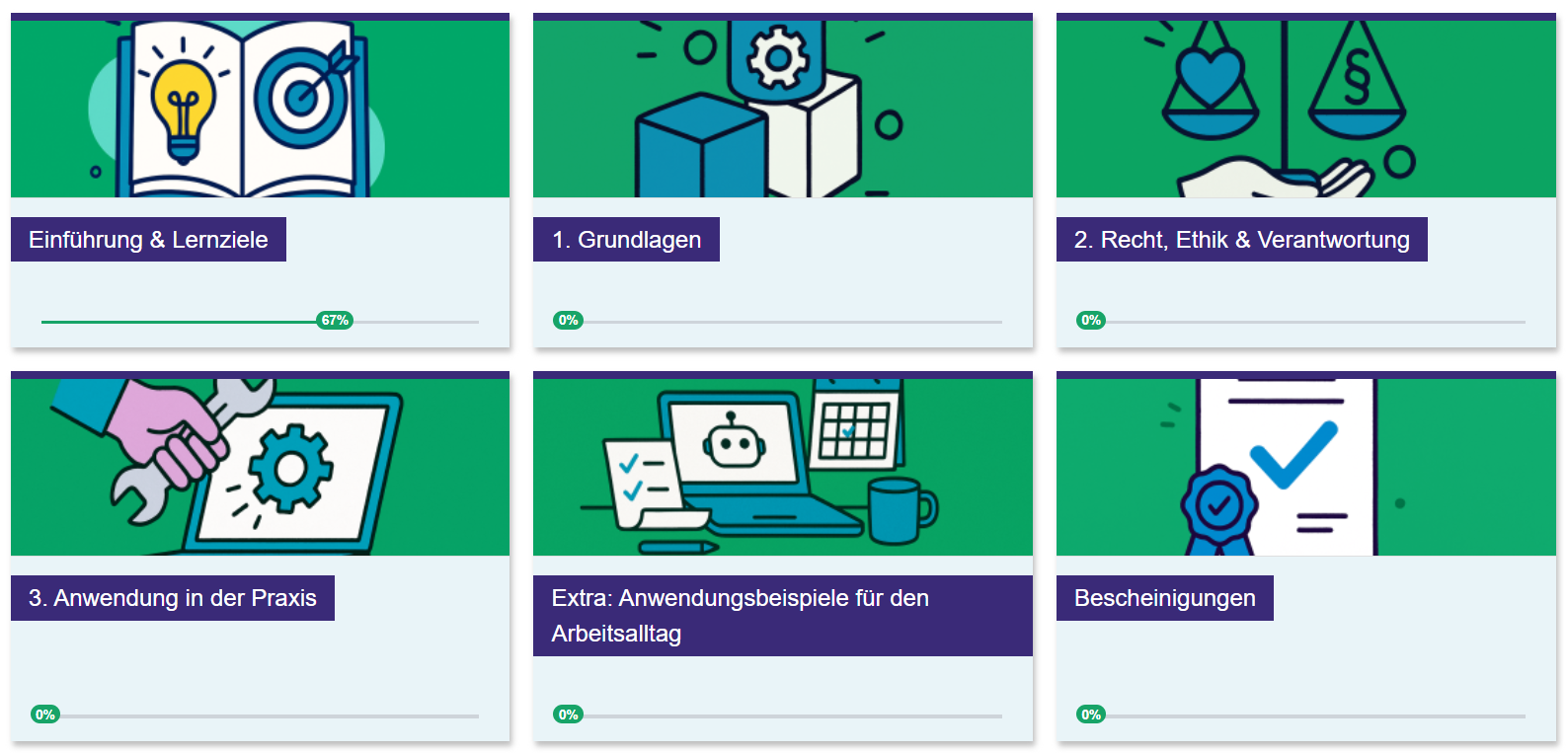AI competences for university administration: Responsible practice


With the increasing availability of AI tools, more and more staff in higher education administration are gaining access to artificial intelligence. A new online course on the AI Campus supports administrative teams in systematically acquiring the skills needed to use AI competently – regardless of their university’s technical standing.
Artificial intelligence is increasingly being applied in administrative practice – from text generation to the automated processing of complex queries. Universities are relying on a range of solutions: central platforms, local systems or commercial providers.
Challenge: Competent use of AI in higher education administration
Mere access to these technologies is not enough: what matters is using them responsibly and consciously. In parallel with technical possibilities, legal obligations are also arising. Since 2 February 2025, the EU AI Act (Article 4) requires all AI providers and operators – including universities – to ensure that their staff possess a ‘sufficient level of AI competences’. This requirement makes clear: AI competences are no longer a luxury, but an obligation.
Coordinated support and a variety of solution approaches
The higher education landscape is demonstrating different approaches in the use of AI tools. For example, North Rhine-Westphalia provides all public universities as well as universities of art and music with a central, data protection-compliant access to artificial intelligence through KI:connect.nrw. The RWTH Aachen project consortium, funded by the Land, is responsible for the technical management.
At the same time, many universities are developing their own AI solutions or are using other commercial providers. This diversity reflects the varying needs, budgets, digitalisation priorities, and strategic directions of the institutions.
The Digital Support Processes coordination body (KDU.NRW) addressed the topic of artificial intelligence in administration in 2025 by creating a central coordination office for AI in higher education administration. It brings together existing AI solutions, collects proven practices, and supports their joint implementation and the exchange of experience. KDU.NRW is funded by the Digitale Hochschule NRW (DH.NRW).
Different starting positions: Small universities, big challenges
Structural differences between universities also have an impact on building competences. While large universities create dedicated positions for AI topics and establish comprehensive digital strategies, smaller universities often lack personnel and financial resources – especially for staff training or in-house expertise.
This is exactly where the significance of the KI:connect.nrw rollout becomes apparent: It democratizes access to AI tools and makes them available to all universities in NRW – regardless of their size or resources. However, with access comes the responsibility to enable all staff to use these tools competently.
That is why a systematic and broad-based development of competences is necessary. All employees should be able to use available tools safely and appropriately.
The reality is complex: many administrative staff are already experimenting with various AI platforms, learning through trial and error and developing their own working methods. On the one hand, this is positive, but it also involves risks – especially if data protection, quality assurance or ethical aspects are not adequately taken into account.
Systematic empowerment for administrative practice through a new online course
This is where the new online course “KI-Kompetenzen in der Hochschulverwaltung” on the AI Campus comes in. It was developed jointly by KDU.NRW and the Stifterverband and aims to empower administrative staff in the responsible and purposeful use of AI tools. The course teaches both theoretical fundamentals and practical applications – focusing on everyday administrative practice. It is aimed at all staff in the administrative sector, across all types of universities and organisational levels.
Course overview: "KI-Kompetenzen in der Hochschulverwaltung"
The course offers a structured answer to the question: How can we ensure that all staff – regardless of their previous experience or their university's resources – can work competently with AI?
Artificial intelligence can make administrative work processes more efficient, flexible and service-oriented. Routine tasks such as processing applications or responding to frequently asked questions can be partially automated. This eases the burden on staff and allows time for more complex, value-adding tasks.
Staff need to understand when and how to use AI tools effectively, what limitations they have, and how to achieve high-quality results. They require competences in formulating precise prompts, in critically evaluating AI-generated content, and in managing data protection requirements.
Through interactive learning content, the course demonstrates how AI tools can successfully support work processes, while not neglecting critical reflection. Participants learn to assess the opportunities and challenges of using AI, formulate high-quality prompts, and critically review AI-generated results.
The course is aligned with the objectives and principles of the AI Act, in particular regarding information, transparency and responsible AI use. This means staff not only gain in-depth knowledge, but also a certificate recognising their AI competences for supervisors, data protection officers and inspection bodies – an important proof in light of new legal requirements.
With this course, we help universities bridge the existing gap between the technical availability of AI and its qualified use – whether they already have an institutional AI strategy or are just taking the first steps. We are pleased to draw more attention to the required AI competences in higher education administration and look forward to your feedback!

Tatiana Moneth is a consultant for artificial intelligence in higher education administration and a TÜV Rheinland-certified AI consultant. With a solid background in data science, media and cultural studies, and project management, she combines technical expertise with strategic thinking. She supports universities in North Rhine-Westphalia in making meaningful use of AI technologies, develops innovative usage scenarios together with stakeholders, and accompanies the implementation of data-based solutions. Her particular focus is on making the potential of artificial intelligence tangible for university administration and promoting cross-organizational networking. Together with the KDU.NRW team, she supports statewide digitization projects and drives the development of a coherent IT architecture – in line with key legal requirements such as the OZG and the E-Government Act.
